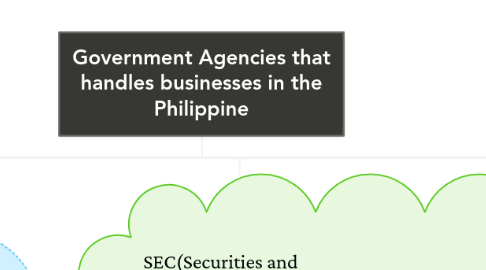Government Agencies that handles businesses in the Philippine
by webster john morada

1. BIR(Bureau of Internal Revenue)
1.1. is an agency of Department of Finance. BIR collects more than half of the total revenues of the government. Caesar Dulay is the current Commissioner of BIR.
2. DTI(Department of Trade and Industry)
2.1. is the executive department of the Philippine Government tasked as the main economic catalyst that enables innovative, competitive, job generating, inclusive business, and empowers consumers.
3. Local Barangay
3.1. You need to secure a company barangay clearance first in the barangay where your business will be operating. It is also a requirement when registering for a Mayor’s Permit.
4. SEC(Securities and Exchange Commission)
4.1. is a U.S. government agency that oversees securities transactions, activities of financial professionals and mutual fund trading to prevent fraud and intentional deception. The SEC consists of five commissioners who serve staggered five-year terms. No more than three of the commissioners may belong to the same political party.
5. PEZA(Philippine Economic Zone Authority)
5.1. is a government agency in the Philippines attached to the Department of Trade and Industry created to help promote investments in the export-oriented manufacturing industry into the country by assisting investors in registering and facilitating their business operations and providing tax incentives.
6. City Hall
6.1. A Business Permit is sometimes also referred to as a Mayor’s Permit because it is processed at the City Hall – the office of the mayor. Securing a business permit from the Mayor’s Office can only be done after accomplishing two other registrations
7. SSS/PAGIBIG/PHILHEALTH
7.1. The term “employee” denotes any person legally employed in the Philippines, any person compulsorily covered by the GSIS under the Commonwealth Act 186, or any person compulsorily covered by the SSS under Republic Act 1161. Such employee is automatically covered for these government-mandated employee benefits. This includes self-employed individuals or freelancers.


